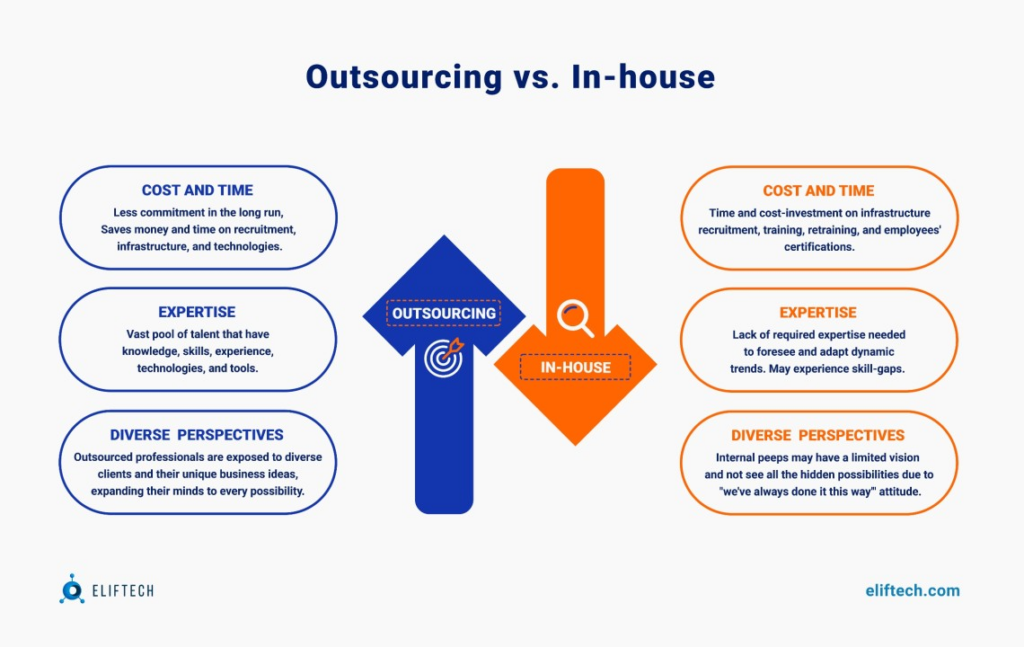Deciding between in-house and outsourcing can be a difficult task for many business owners. Studies show that 37% of companies prefer to outsource their business processes.
This blog is your comprehensive guide, providing the pros, cons, and factors you need to consider when deciding which route best fits your company’s needs.
Key Takeaways
- In-house work offers more direct control, clearer communication, easier quality control, and on-site availability.
- Outsourcing can provide cost savings, increased efficiency, and access to a wider talent pool.
- Consider factors such as project scope, specialized skills availability, and budget constraints when deciding between in-house work and outsourcing.
Pros and Cons of In-House Work
In-house work offers more direct control, clearer communication, easier quality control, and on-site availability. However, it also comes with a higher cost, potential staffing issues and slowdowns, and the need for specialized training.

More direct control
Maintaining in-house work often gives managers and leaders significant hands-on involvement. Direct control allows businesses to oversee day-to-day operations without relying on a third-party entity.
Decisions can be made promptly and changes implemented immediately, fostering efficient task management. An effective team leader can also adjust resource allocation as needed, tweaking the project timeline or workload distribution at will.
This level of supervision proves essential in sectors requiring high precision, such as manufacturing or software development. Ultimately, direct control presents an advantage for businesses that value swift decision-making and seamless project handling.
Clearer communication
Clear communication is a significant advantage of in-house work. When managing projects and day-to-day operations, having direct control over the team allows for more effective communication.
Without the need to go through intermediaries, information can be conveyed quickly and accurately. This facilitates smoother decision-making processes, resource allocation, and strategic planning.
With clear communication channels, risks can be managed more efficiently, as all parties involved are on the same page regarding expectations and deliverables. In-house teams also have the ability to address issues promptly without relying on external factors or delays from third-party companies.
Easier quality control
Maintaining quality control is simpler when work is done in-house. With direct oversight and involvement, businesses can closely monitor the production process and ensure that high standards are met.
Any issues or errors can be quickly addressed, leading to faster problem-solving and improved overall quality. This level of control allows for better consistency throughout all stages of the project, ultimately resulting in a superior end product.

On-site availability
On-site availability is a key advantage of in-house work. When your team is located on-site, it becomes easier to manage and oversee day-to-day operations. You have direct access to your employees, allowing for more immediate communication and collaboration.
This proximity also enables quicker problem-solving and decision-making processes when issues arise. With the entire team working together in one location, you can ensure that resources are allocated efficiently and tasks are completed promptly.
Overall, on-site availability provides the opportunity for greater control over the project handling and allows for effective management of the talent pool within your organization.
Higher cost
Outsourcing may seem like an attractive option for businesses looking to save money, but it’s important to consider the higher cost associated with this approach. By outsourcing tasks, companies often have to pay fees or contracts that can significantly increase their overall expenses.
These costs can include service fees, contractor payments, and other charges that are not present when utilizing in-house resources. While outsourcing may offer certain benefits, such as access to specialized skills and expertise, it’s crucial to carefully weigh these advantages against the higher financial burden it can place on your organization.
Potential staffing issues and slowdowns
Staffing issues and slowdowns can be a potential drawback of in-house work. When relying solely on internal resources, there is a risk of shortages or delays in finding suitable staff members for projects.
This can lead to bottlenecks in task management and slower progress on day-to-day operations. Additionally, if specialized skills are needed that are not readily available within the company, it may take time to train existing employees or seek external talent through hiring processes.
It is important to carefully consider the availability and capacity of the talent pool when deciding between in-house and outsourcing options to avoid potential staffing issues and maintain efficiency throughout the project.
In contrast, outsourcing provides an alternative hiring option that can mitigate some of these staffing concerns. By partnering with a third-party company or contractor, businesses have access to a wider talent pool without having to go through extensive recruitment processes.
Outsourcing allows for the quick fulfillment of positions with skilled individuals who possess the specific expertise required for the project at hand. This approach helps save on costs associated with training or reassigning internal resources while ensuring the timely completion of tasks.
Need for specialized training
Specialized training is necessary when considering in-house work. This type of training ensures that employees have the specific skills and knowledge needed to handle the day-to-day operations of a particular task or project.
By providing specialized training, companies can ensure that their employees are equipped to effectively manage and complete projects with precision and expertise. Whether it’s software development, manufacturing, or any other business process, having employees with specialized training allows for greater efficiency and better decision-making within the organization.
Pros and Cons of Outsourcing
Outsourcing offers cost savings, and increased efficiency, but challenges in maintaining company standards. Read more to understand the factors involved in making the right decision for your business.
Cost savings
Outsourcing can provide significant cost savings for businesses. By hiring a third-party company to handle certain tasks or projects, companies can save on costs associated with in-house resources, such as salaries, benefits, and overhead expenses.
This is especially true for functions like software development and manufacturing, where outsourcing to countries with lower labor costs can result in substantial savings. Additionally, outsourcing allows businesses to avoid upfront investments in infrastructure and equipment that would be necessary if the work were done in-house.
Overall, cost savings are an effective way for companies to allocate their resources strategically and achieve greater efficiency in their day-to-day operations.
Less infrastructure
Outsourcing certain tasks or projects can be beneficial for companies that have limited infrastructure. By partnering with a third-party company, businesses can save on costs related to setting up and maintaining the necessary physical resources.
This allows organizations to focus their budget on other areas while still getting the work done efficiently. With outsourcing, there is no need to invest in additional equipment, office space, or technology infrastructure, making it a cost-effective option for businesses looking to streamline operations without expanding their infrastructure.
Outsourcing also provides access to a wider talent pool without the need for direct control over day-to-day operations. Instead of hiring employees to fulfill specific roles in-house, companies can rely on specialized contractors from external sources who are already equipped with the skills needed for specific projects.
This not only saves time and effort spent on recruitment but also opens up opportunities for collaborating with experts from various industries who can contribute fresh perspectives and innovative solutions.
Increased efficiency
Outsourcing certain tasks or projects can lead to increased efficiency for a company. By bringing in specialized expertise from a third-party company, businesses can streamline their day-to-day operations and make the most of their available resources.
This allows companies to focus on strategic planning, decision-making, and risk management while the outsourced team takes care of the specific task at hand. Whether it’s software development or manufacturing, outsourcing offers an effective way to increase efficiency and achieve cost savings by harnessing the talent pool available beyond in-house resources.
Difficulty replacing contractors
Replacing contractors can pose challenges for companies that outsource their work. When a contractor is no longer available, it can be time-consuming and costly to find a suitable replacement.
The company may have to go through the process of interviewing and hiring new contractors, which can delay project timelines. Additionally, finding someone with the same level of expertise as the previous contractor may prove difficult.
This difficulty in replacing contractors can disrupt workflow and impact productivity if not managed effectively.
Challenges in maintaining company standards
Maintaining company standards can be a challenge when outsourcing work. Without direct control and communication, ensuring that the third-party company meets your specific requirements becomes more difficult.
It may also pose a risk in terms of quality assurance and timely completion of projects. Additionally, there is a potential for misalignment between the outsourced team’s goals and your company’s overall vision and values.
These challenges highlight the importance of carefully selecting an outsourcing partner who can uphold your standards while delivering on project objectives.

Less control and communication
Outsourcing work to external contractors may result in less control and communication compared to in-house operations. When tasks are outsourced, there is an inherent distance between the third-party company and the main organization.
This can make it challenging for businesses to maintain a high level of direct control over day-to-day operations and decision making. Additionally, because outsourcing involves working with individuals or teams outside of the company, there may be gaps in communication that can lead to misunderstandings or delays in project handling.
It’s important for businesses considering outsourcing to carefully evaluate their need for direct control and continuous communication before deciding on this hiring option.
Factors to Consider in Choosing Between In-House and Outsourcing
Consider the project scope, availability of specialized skills, budget constraints, and the need for direct control and communication when deciding between in-house work or outsourcing.
Project scope and duration
The scope and duration of a project play a crucial role in deciding whether to handle it in-house or outsource it. For smaller projects with short timelines, in-house work may be more feasible as it allows for better control over day-to-day operations and quick decision-making.
On the other hand, larger projects with longer durations might benefit from outsourcing as it provides access to a larger talent pool and helps save on costs. Considering the project’s specific requirements and timeline will help determine the most efficient way to proceed.
Availability of specialized skills
In deciding between in-house work and outsourcing, one important factor to consider is the availability of specialized skills. If your project requires specific expertise that your in-house team may not possess, outsourcing can be a viable option.
By partnering with a third-party company or contractor who specializes in the skills you need, you can fulfill the position without having to invest time and resources into training your existing staff.
This allows for a quicker turnaround time and ensures that your project is handled by professionals with the necessary knowledge and experience. It’s worth noting that in some cases, maintaining an in-house team with diverse skill sets may still be beneficial, especially if there is ongoing demand for those skills within your organization.
Budget constraints
Budget constraints play a crucial role in deciding whether to keep work in-house or outsource it. When considering budget limitations, companies must assess the cost-effectiveness of each option.
In-house work often involves higher costs due to salaries, benefits, infrastructure, and equipment. On the other hand, outsourcing can provide cost savings by eliminating these overhead expenses and allowing businesses to pay only for the specific services they require.
By carefully evaluating their budget constraints, companies can decide whether to allocate resources internally or seek external solutions that align with their financial goals.
Need for direct control and communication
Direct control and communication are crucial factors when considering whether to choose in-house work or outsourcing. With in-house work, businesses have more direct control over their day-to-day operations and can easily communicate with their team members.
This allows for quicker decision-making, efficient resource allocation, and effective strategic planning. On the other hand, outsourcing may result in less control and communication as businesses rely on a third-party company to fulfill certain roles.
While this can lead to cost savings and access to a larger talent pool, it may also pose challenges in terms of maintaining company standards and ensuring that projects are executed according to expectations.
Conclusion
In conclusion, the choice between in-house work and outsourcing depends on various factors such as project scope, specialized skills availability, and budget constraints. While in-house work allows for direct control and communication, outsourcing offers cost savings and increased efficiency.
Ultimately, businesses should carefully evaluate their needs and weigh the pros and cons to determine which option suits their specific requirements.
Frequently Asked Questions
1. What is the difference between in-house and outsourcing?
In-house involves using your own resources for role fulfillment and day-to-day operations, while outsourcing means hiring a third-party company to handle certain tasks.
2. When should I consider business outsourcing?
Outsourcing makes sense when it offers cost reduction advantages or when specific use cases require expertise beyond what your current labor market or in-house resources can provide.
3. If cost-effective, should all tasks be outsourced?
No, not necessarily. Critical operations that directly affect customer relationships or proprietary information might be better managed in-house despite offshoring’s appeal for cost-effectiveness.
4. Can a mix of insourcing and offshoring work?
Yes! Many companies find a balance between keeping key functions in-house while also utilizing the benefits of business outsourcing for less critical parts of their operation.




